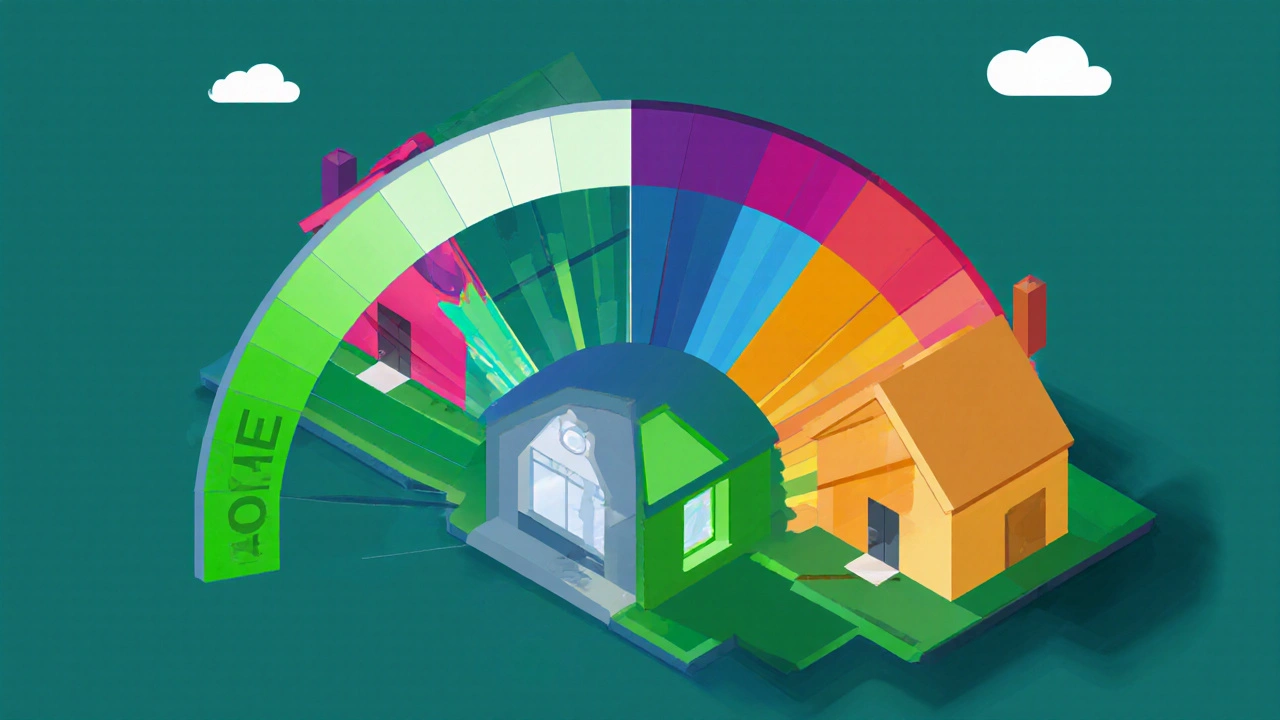Equity Loan Credit Score Calculator
Calculate the minimum credit score you need for an equity loan based on your specific circumstances.
Estimated Minimum Credit Score
Key Takeaways
- Most Australian lenders look for a credit score of 620+ for a standard equity loan.
- Higher loan‑to‑value (LTV) ratios or older borrower age can push the required score above 660.
- Improving your score by 30‑50 points before you apply can unlock better rates and lower fees.
- If you fall short, reverse mortgages or secured personal loans are viable alternatives.
- Every lender weighs credit score alongside income, property value, and repayment capacity.
What Exactly Is an Equity Loan?
When you tap into the value of a property you already own, you’re using an equity loan is a secured borrowing product that lets homeowners borrow against the market value of their house. Unlike a traditional mortgage that funds a purchase, an equity loan adds a second debt on top of any existing mortgage. Lenders typically reserve equity loans for renovations, debt consolidation, or major expenses because the loan is backed by the home’s equity.
How Credit Scores Work in Australia
Your credit score is a three‑digit number that reflects how reliably you’ve repaid credit in the past. The three major Australian credit bureaus - Equifax, Experian and illion - each generate scores ranging from 0 to 1,200. A higher score signals lower risk to lenders.
Most banks use a “risk band” system: Low risk (660‑1,200), medium (620‑659), high (below 620). Your score influences not only approval odds but also interest‑rate tiers and fees.

Typical Minimum Credit Score Thresholds for Equity Loans
While each lender sets its own policy, the industry median looks like this:
| Credit Score Range | Typical LTV Allowed | Approval Likelihood | Typical Interest‑Rate Tier |
|---|---|---|---|
| 660-1,200 | Up to 80% | High | Best rates (3.5%‑4.0% p.a.) |
| 620-659 | Up to 70% | Medium | Mid‑range rates (4.1%‑5.0% p.a.) |
| Below 620 | Up to 60% | Low | Higher rates (5.1%‑6.5% p.a.) |
In practice, the minimum credit score most lenders will accept sits at 620. Anything lower usually triggers either a higher LTV restriction or a refusal.
Why the Required Score Can Vary
Credit score isn’t the only knob lenders turn. Here are the main factors that can push the needed score up or down:
- Loan‑to‑value (LTV) is the proportion of the loan amount to the property’s appraised value. A higher LTV means more risk, so lenders demand a stronger score.
- Borrower age matters for reverse‑mortgage style equity releases - older applicants may get a lower required score because the loan is repaid later.
- Stable, documented income (salary, rental income, or business profits) can offset a marginally lower score.
- Existing debt load - high credit‑card balances or other loans reduce the score’s impact.
- Property location and type - a primary residence in a high‑growth suburb may be viewed more favorably than an investment property.
How Lenders Assess Your Equity‑Loan Application
Below is a typical step‑by‑step flow:
- Pre‑approval questionnaire - you provide basic details, including your credit‑score range.
- Full credit pull - the lender contacts one of the three Australian credit bureaus to retrieve your official score.
- Property appraisal - a licensed valuer determines the current market value.
- From this, the lender calculates the LTV.
- Income and repayment analysis - payslips, tax returns, or business accounts are examined.
- Affordability is measured against the proposed loan repayments.
- Risk‑based pricing - based on score, LTV, and income, the lender assigns an interest rate tier.
- Higher scores get lower rates.
- Final approval - you receive a contract, go through a cooling‑off period, and then settlement occurs.

Practical Tips to Boost Your Credit Score Before Applying
- Pay down credit‑card balances to below 30% of each limit.
- Correct any errors on your credit report - request a free copy from each bureau and dispute inaccuracies.
- Avoid opening new credit lines or taking out personal loans in the 90‑day window before you apply.
- Keep older accounts open; the length of credit history contributes positively.
- Set up automatic payments for existing bills to ensure a spotless payment history.
Even a modest 40‑point rise can move you from the “medium” to the “low‑risk” band, unlocking better loan terms.
What If You Don’t Meet the Minimum Score?
Don’t panic - there are alternatives:
- Reverse mortgage is a type of equity release designed for seniors that doesn’t require repayments until the home is sold or the borrower passes away. Credit‑score thresholds are often lower because the lender’s risk is mitigated by the borrower’s age.
- Secured personal loan - using the property as collateral but with a smaller LTV, making it easier for lower‑score borrowers.
- Family loan or private equity - if you have trusted relatives, a private agreement may bypass formal credit checks.
- Partner with a co‑borrower who has a higher score - joint applications can raise the overall credit profile.
Each alternative carries its own cost structure, so compare interest rates, fees, and repayment flexibility before deciding.
Frequently Asked Questions
What is the absolute lowest credit score a bank will accept for an equity loan?
Most major Australian banks set 620 as the floor. Some credit‑union lenders may go down to 600, but expect higher interest rates and stricter LTV limits.
Does a high LTV automatically raise the required credit score?
Yes. Borrowing 80% or more of your property value is seen as risky, so lenders often ask for a score above 660 to offset that risk.
Can I improve my score fast enough to apply within a month?
If your score is already in the 600‑630 range, paying down revolving debt and correcting report errors can boost it 30‑50 points in 30‑45 days. Results vary, so monitor progress weekly.
Do reverse mortgages have the same credit‑score requirements?
Reverse mortgages focus more on borrower age and property equity than on credit score. Many providers will approve applicants with scores as low as 500, but they may charge higher fees.
Is a joint application better if my partner has a higher score?
A joint application combines both credit histories. If one partner scores 720 and the other 580, the lender will usually weigh the higher score, improving approval odds and potentially lowering the interest rate.
